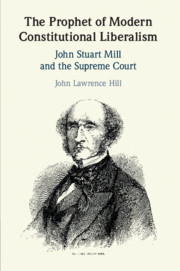Book contents
- The Prophet of Modern Constitutional Liberalism
- The Prophet of Modern Constitutional Liberalism
- Copyright page
- Dedication
- Contents
- Introduction
- Part I Mill and His Place in the Liberal Tradition
- Part II Mill and the Constitution
- 4 Constitutional Liberties before Mill
- 5 The Intellectual Origins of the Right to Privacy
- 6 Mill and Modern Freedom of Expression
- 7 A New Equality
- Index
5 - The Intellectual Origins of the Right to Privacy
from Part II - Mill and the Constitution
Published online by Cambridge University Press: 02 April 2020
- The Prophet of Modern Constitutional Liberalism
- The Prophet of Modern Constitutional Liberalism
- Copyright page
- Dedication
- Contents
- Introduction
- Part I Mill and His Place in the Liberal Tradition
- Part II Mill and the Constitution
- 4 Constitutional Liberties before Mill
- 5 The Intellectual Origins of the Right to Privacy
- 6 Mill and Modern Freedom of Expression
- 7 A New Equality
- Index
Summary
When the Supreme Court overruled Lochner and its progeny, it did not – for long, at least – discontinue using the Due Process clause and other constitutional provisions to protect un-enumerated constitutional rights. Within a few years it began to work out the contours of a new conception of personal freedom, one with very different social and political ramifications than the older, classical liberal ideal exemplified by Lochner. Central to the more recent idea of liberty is the notion of expressive self-individuation. When expressed in constitutional terms, this ideal has three dimensions: First, there must be an individual realm which is, as much as possible, free from governmental and social influences – a realm of privacy in which the individual can “become himself” and live the kind of life he or she wishes. Second, the individual must be free to express his ideas, opinions, thoughts and – in the deepest sense – himself in the non-private sphere.
- Type
- Chapter
- Information
- The Prophet of Modern Constitutional LiberalismJohn Stuart Mill and the Supreme Court, pp. 77 - 99Publisher: Cambridge University PressPrint publication year: 2020



